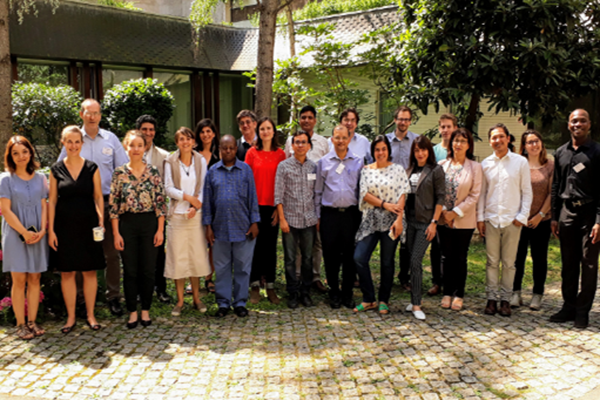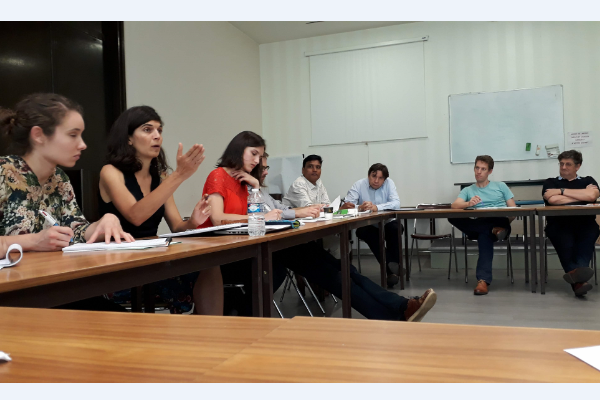Seminar on ‘Work in the ecological transition’ (19-20 June 2018, Paris)

Seminar on ‘Work in the ecological transition’ (19-20 June 2018, Paris)
Organized by CERAS to wider the research held in France.
On the 19th and 20th of June 2018, CERAS (Centre de Recherche et d’Action Sociales) invited different stakeholders from around the world to reflect upon the topic: “Work in the ecological transition”. This meeting was a proposal from the French research-action group who is working on the same topic. The group wanted to deepen their analysis by considering the viewpoints from other parts of the world.
Around twenty-five people came, actors invited were partners to the CERAS, researchers from Jesuit social centers, as well as local players and international leaders from grassroots organizations working in the field of labor, agriculture and ecological transition.
The introductory session of the seminar created a space for the contextualization of the project’s research. The track is in fact part of the global project ‘The Future of Work, Labour after Laudato Si’’ and is based on the review of Laudato si’ and its possible implication for the world of work. Pierre Martinot-Lagarde, ILO Special adviser for socio-religious affairs, reminded the audience of the various expected outcomes and gave an overview of the project’s position linked to the centenary of the International Labour Organization (ILO) which will be celebrated in 2019. After that, Father Augusto Zampini, a theologian who works at the Vatican Dicastery for Promoting Integral Human Development, presented a review of Laudato si’ which allowed participants to assess the profound message of Pope Francis in his encyclical as well as to enter in the subject of the seminar.
The first day of the meeting focused on the various geographical perspectives of ‘work in the ecological transition’. Through four roundtables, experts grouped by continent presented the ecological challenges and the working conditions in specific countries. As underlined in Laudato si’ encyclical, God’s work is in the direction to the ‘creation’ and human beings are at the service of the creation. Consequently, we must protect the environment around us now and for the future generation.
Experts from the panels, gave concrete example, testimonies and experience sharing of their realities, of what is happening on the field. Thus, participants could identify connection between the cries of the poor and the cry of the earth. The discernment was focused on wherever precarious workers are the ones who feel the most environmental damage. As well as thinking if there is the same economic logic behind the degradation of human dignity and nature?
The approach of the seminar helped the participants to have a full picture of the environmental reality as experienced by the most disadvantaged people. The overall objective of the panel discussion was to bring awareness and to perceive the interconnection between work and the ecological transition. With that, the roundtable discussions enabled the participants to highlight commonalities in the different regions, such as challenges of migration, informal economy and climate change consequences. Those who partook in the seminar shared their concerns over achieving a positive relationship between economic growth and decent work (as emphasized by SDG 8), whilst also attempting to respect the environment and limiting the effect of climate change. It was underlined that decent work is the priority for disadvantaged people and that it will help to achieve better life for all. In addition, our work must have positive effect on our common home, the Earth.
At the end of the first day, the organizers proposed to have a wrap-up session to share their thoughts and observations of the day. This session was a great opportunity to prepare for the mindset of the next day.

The second day of the seminar was based on the international dimension of the topic. It was an opportunity first to discern the Sustainable Development Goals’ (SDGs) hidden outlook and ambition, thus to measure the achievement of it. Leaders of international movements outlined global issues related to ‘work in the ecological transition’, for instance the concern of youth and future of work, as well as the complexity of decent work in the global value chains. Some examples of common action illustrated the need to collaborate to face challenges. One important example of collaboration is inter-faith dialogue and action.
After that, the audience split into workgroups to integrate the Social Doctrine of the Church in the analysis. Human dignity, social justice, common goods, subsidiarity, solidarity and the preference for the poor were echoed with an ‘Earth-friendly work’. The call for traditional values was crucial in the push for action. Therewith a need to revise the doctrine in light with the new sign of time, specifically in relation to the ecological transition.
The last part of the seminar focused on the preparation of the symposium that will be held in May 2019. The symposium aims to carry out the research ‘Work in the ecological transition’ following the three main questions that the research-action group France generated:
- “Cry of the Earth”, “cry of the poor”: what are the realities of work/labor in terms of social and environmental questions?
- Concentrating on what matters: how can we reinstate human activity within the planet’s limits?
- Labor as a common horizon: taking action to build collectively a relational and sensible economy.
The objective of CERAS was to involve stakeholders in the planning of the meeting. The proposed agenda for the symposium will follow the method SEE-JUDGE-ACT. The participants of the seminar were asked to identify main issues of the mentioned topic and to propose themselves for deepening the reflection towards the symposium.
The end of the seminar was a time of review. Everyone thanked the organizers and had the opportunity to express what they learnt and how it echoed their own experience.

